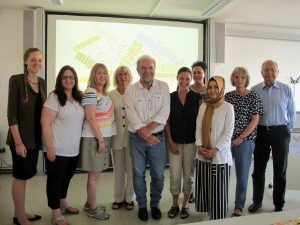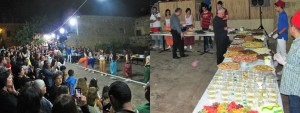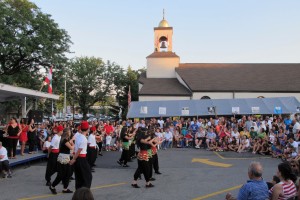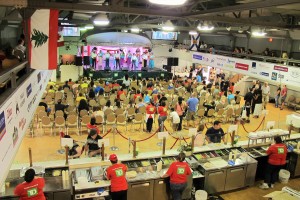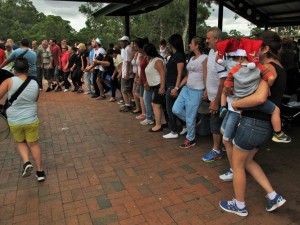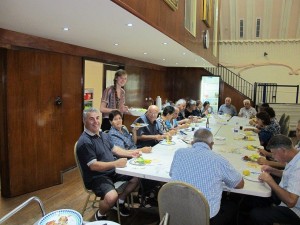DEUTSCH
2018
Workshop "Syrian Refugees in Lebanon, Germany and beyond - Research and Analysis"
Since mid-2018, the German Research Foundation (DFG) is funding a project entitled "Communities of Syrian Refugees in Germany". As a launch event of the project, the workshop entitled "Syrian Refugees in Lebanon, Germany and beyond - Research and Analysis" took place in April 2018 at the Lebanese American University (LAU) in Beirut. The event was organised by the Chair of the Institute for Migration Studies (IMS), Prof. Dr. Paul Tabar, in collaboration with Prof. Dr. Anton Escher, Dr. Ahmad Izzo and Dipl.-Geogr. Marie Karner who are affiliated with the Institute of Geography at the Johannes Gutenberg University Mainz.
Thematically, the scientific talks and discussions dealt with the everyday life of Syrian refugees in different local contexts. Researchers gave an insight into ongoing empirical studies in Lebanon and Germany. With this regional focus, the legal status of Syrian refugees, their specific strategies for coping and organizing everyday life, changes in gender relations and cultural practices as well as dynamics within host societies were discussed. From a historical perspective, a comparison of national immigration policies was linked to discussions about different Lebanese-Arabic terms used to label migrants and refugees.
The scientific cooperation between the JGU and the LAU in Beirut dates back to 2011 and is based on a "Memorandum of Understanding on Scientific Cooperation". Several times, cooperation partner Prof. Paul Tabar has been a visiting professor at the Institute of Geography in Mainz. In recent years, three scientific conferences were jointly organised in Mainz and Beirut with the participation of international scientists. We are highly grateful to Prof. Paul Tabar for his hospitality during our stay in Beirut and look forward to future collaborations.
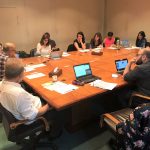
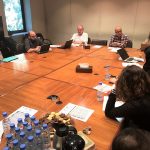
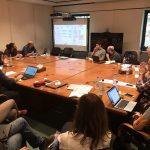
If you are interested in writing your bachelor or master thesis in the context of the project “Communities of Syrian Refugees in Germany", please contact Univ.-Prof. Dr. Anton Escher, Dr. Ahmad Izzo or Dipl.-Geogr. Marie Karner.
2017
Workshop "Migrant Narratives – Moving Stories", from Monday, July 17th till Wednesday, July 19th 2017
In July 2017, the Center for Intercultural Studies (ZIS) of the Johannes Gutenberg University Mainz (JGU) organized an international workshop entitled "Migrant Narratives - Moving Stories" in cooperation with the Institute of Geography of the JGU and the Victoria University of Wellington (New Zealand). The event enabled an exchange of ideas on migrant narratives with a focus on methodical and analytical questions.
Participants of the Workshop „Migrant Narratives – Moving Stories“ (from left to right): Dipl.-Geogr. Marie Karner (JGU Mainz), Prof. Dr. Anastasia Christou (Middlesex University London), Prof. Dr. Angela McCarthy (University of Otago), Prof. Dr. Marita Eastmond (University of Gothenburg), Prof. Dr. Anton Escher (JGU Mainz), Prof. Dr. Silke Meyer (Innsbruck University), Dr. Anya Ahmed (University of Salford Manchester), Fatma Haron, MA. (Innsbruck University), Prof. Dr. Brigitte Bönisch-Brednich (Victoria University of Wellington), Prof. Dr. Rolf Wilhelm Brednich (Victoria University of Wellington); absent: Dr. J. Olaf Kleist (Osnabrück University)
2015
Workshop „Migration Studies: Reflection and Challenges“, Friday and Saturday, November 27th and 28th 2015 (Orient-Institut Beirut)
As part of the DFG-Project the workshop „Migration Studies: Reflection and Challenges“ (Program) took place in November 2015 in Beirut. The event was jointly organized by the Institute of Geography at the Johannes Gutenberg-University Mainz (JGU) and the Institute for Migration Studies 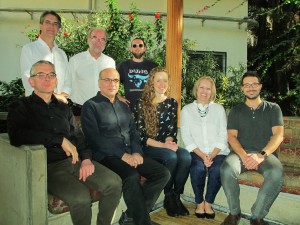 (IMS) at the Lebanese American University (LAU). The workshop served as a platform for discussions for international scientists who conduct research on (lebanese) migration and diaspora. Several theoretical conceptualizations and results of the empirical research on Lebanese global village communities were debated intensively among the participants. In addition, emphasis was put on existent challenges of migration research with a focus on the current movements of refugees to Europe.
(IMS) at the Lebanese American University (LAU). The workshop served as a platform for discussions for international scientists who conduct research on (lebanese) migration and diaspora. Several theoretical conceptualizations and results of the empirical research on Lebanese global village communities were debated intensively among the participants. In addition, emphasis was put on existent challenges of migration research with a focus on the current movements of refugees to Europe.
The workshop participants were Dr. Philipp Bruckmayr (UNIVIE), Prof. Dr. Anton Escher (JGU), Matthias Gebauer M.A. (JGU), Dipl.-Geogr. Marie Karner (JGU), Prof. Dr. Greg Noble (UWS), Prof. Dr. Jennifer Skulte-Ouaiss(LAU), Prof. Dr. Martin Sökefeld (LMU), Prof. Dr. Paul Tabar (LAU) and Dr. Omar Bortolazzi (UNIBO).
Public Lecture “Political Remittances and Lebanon: The case of a decentered diasporic field” by Prof. Dr. Paul Tabar, Friday, November 27th 2015, 6-8 pm (Orient-Institut Beirut)
Within the workshop „Migration Studies: Reflection and Challenges“, which is part of the DFG-Project, a public lecture was given by Prof. Dr. Paul Tabar (Lebanese American University) at the Orient-Institut Beirut (OIB).
This presentation consists of two parts: the first discusses the concept of 'political remittances' by examining the context in which it first appeared as part of the growing interest in studying migration and transnationalism. In so doing, this part briefly reviews the current writings on this concept and what benefits and (possible) limitations it brings with it to migration studies. Then, this part suggests ways to further develop the concept of ‘political remittances’ similar to what has been done to the concept of ‘social remittances’ as coined by Peggy Levitt and developed by her and other scholars. To better understand ‘political remittances‘, we need to further show how they are brought into being, how they travel back ‘home‘ and the differential impact they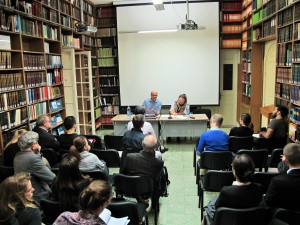 have on ‘home‘ politics. In addition, the presentation makes a case for a conceptual distinction between the ‘transnational field‘ as opposed to the ‘diasporic field‘ and shows the usefulness of conceptualizing ‘political remittances’ as part of the latter. It is contended that the ‘diasporic field’ is the appropriate conceptual framework within which to analyze the contested formation, trajectory and impact of ‘political remittances‘.
have on ‘home‘ politics. In addition, the presentation makes a case for a conceptual distinction between the ‘transnational field‘ as opposed to the ‘diasporic field‘ and shows the usefulness of conceptualizing ‘political remittances’ as part of the latter. It is contended that the ‘diasporic field’ is the appropriate conceptual framework within which to analyze the contested formation, trajectory and impact of ‘political remittances‘.
The second part of the presentation will use the case of Lebanon to show the analytical usefulness of the above perspective. Based on interviews conducted in Lebanon and three other receiving countries, i.e. Australia, USA and Canada, this part presents the findings of these interviews on the question of the voting right of Lebanese migrants abroad. Examining these views reveals the complexity of voting in a transnational context and associated challenges not only to the political process in the country of origin but also to the migrant community abroad. What are these challenges and how are they tackled by both the 'home' political elite and the politically active elements within the Lebanese Diaspora? At a broader level, this part concludes by showing the decentered character of the diasporic filed in Lebanon.
Fieldtrip to Lebanon
From August 13th till August 28th, 2015 the project team traveled to Lebanon to continue the empirical research on "Lebanese Global Communities". Festivals in honor of the respective patron saints (e.g. Mar Awtel Feast in Kfarsghab) are celebrated in the chosen villages during this period. Furthermore, many Lebanese from abroad visit their villages of origin in the summer month. The project team was able to verify and consolidate empirically the current theoretical design on Global Communities.
Fieldtrip to Easton (USA)
Following the stay in Halifax (Canada) Marie Karner traveled to Easton in Pennsylvania from July 20th till August 4th, 2015 as part of the DFG project "Lebanese Global Communities". The local Lebanese community is organized largely by the Our Lady of Lebanon Church. Its members descend almost exclusively from Kfarsghab, a village in the Wadi Qadisha. The PhD student had the chance to participate in community practices such as a Vacation Bible School, church services and funerals. In particular, the annual Lebanese Heritage Days provided a great opportunity to establish contacts with new interview partners and understand internal dynamics.
Fieldtrip to Halifax (Canada)
Within the project "Lebanese Global Communities", which is funded by the German Research Foundation (DFG), Prof. Dr. Anton Escher and Dipl.-Geogr. Marie Karner realized a field trip in Nova Scotia (Canada) from July 5th till July 20th, 2015. Many members of the Lebanese community in Halifax identify themselves with Diman and Hadath el Jobbeh. These villages are located in the Wadi Qadisha, where the empirical research has been started, that was continued in Australia. In addition to qualitative interviews with representatives of the Diman Association, the Canadian Lebanon Society, the Canadian Lebanese Chamber of Commerce and priests of the Orthodox and Maronite community, they participated in the "Lebanese Festival" and other social events.
Fieldtrip to Dubai
Following the fieldwork in Australia on "Global Lebanese Village Communities" the doctoral student Marie Karner continued her research in Dubai that had been started in October. Explorative expert interviews with the current Consul General of Lebanon in Dubai and Abu Dhabi as well as with a Maronite priest, gave an insight into the Lebanese community in the UAE. In addition, further people were interviewed who feel a sense of belonging to certain villages in the Wadi Qadisha.
2014
Fieldtrip to Australia
Australia has been chosen as the second destination for the empirical work within the DFG-project "Lebanese Global Village Communities". During the summer month before Christmas a variety of events are organized by the ethnic clubs (eg. picnics, Christmas Dinners, Harbor Cruises), in which the doctoral student Marie Karner participated. In Sydney she met many interviewees again, whom she got to know in Lebanon previously. She visited the communal places (eg. club houses) and learned more about the organizational structure and practices of the global village communities.
Workshop „First Results and Further Steps“
As part of the DFG-project "Lebanese Global Village Communities" the workshop entitled "First Results and Further Steps" was held in Dubai in October. The project leader Prof. Dr. Anton Escher and Marie Karner, Ph.D. candidate at the Institute of Geography in Mainz discussed intensively the 3.5-month field stay in Lebanon. They planned the further steps with a view to the previous findings and the established contacts to members of different global Communities. Additionally the research team conducted several interviews with Lebanese coming from the selected Christian villages in the Wadi Qadisha.
Lecture Series - Dr. Steffen Köhn (University Berlin): Mediating mobility
Department of Geography
Thursday 15. January 2015, 16:15-18:00 Uhr, Campus Mainz, Senatssaal (NatFak) more
Lecture Series - Dr. Koen Leurs (University Utrecht): Digital throwntogetherness and transnational affective capital. Exploring digital practices among young migrants
Department of Geography
Thursday 27. November 2014, 16:15-18:00 Uhr, Campus Mainz, Senatssaal (NatFak) more
Fieldtrip to Lebanon
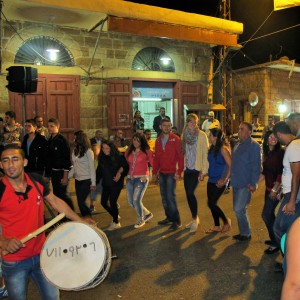 As part of the DFG project "Lebanese Global Village Communities" Marie Karner, Ph.D. candidate at the Institute of Geography in Mainz (Germany), has conducted fieldwork in several villages around the Qadisha Valley from June to September 2014. Her empirical research involved qualitative interviews with migrants and expatriates who live in different countries across the world and were visiting their homeland during the summer months.
As part of the DFG project "Lebanese Global Village Communities" Marie Karner, Ph.D. candidate at the Institute of Geography in Mainz (Germany), has conducted fieldwork in several villages around the Qadisha Valley from June to September 2014. Her empirical research involved qualitative interviews with migrants and expatriates who live in different countries across the world and were visiting their homeland during the summer months.
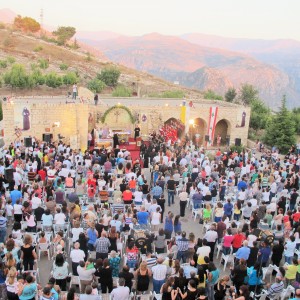
She also talked to local writers, priests, scientists as well as members of NGOs and other associations related to the Lebanese diaspora. With an interest in better understanding the transnational lives, the importance of communication media and the cultural practices of the communities, Marie participated in various functions and festivities.
Workshop “Doing Research in Lebanon”
On May 27 Prof. Dr. Paul Tabar (Beirut), Prof. Anton Escher (Mainz), Dr. Tobias Boos (Mainz), Marie Karner (Mainz)and Johannes Mücke (Mainz)discussed research techniques in migration studies at the Institute of Geography, Johannes Gutenberg-University Mainz. The workshop took place conneceted to the DFG financed project “Lebanese Global Villages”. In June Marie Karner is already started to do qualitative interviews and observations in the Qadisha Valley, Lebanon.
Series of events: „Völkermühle Europas. Migration an Rhein und Mosel“
Organisation: Institut für Geschichtliche Landeskunde an der Universität Mainz e.V.
Date and time: 11.03.2014 at 7 p.m.
Location: planary hall (Plenarsaal) of the Landtag
Free entrance and no inscription necessary (flyer)
2013
Field trip to Lebanon
From 8 till 15 December 2013 Prof. Dr. Anton Escher, Dr. Tobias Boos und Dipl.-Geogr. Marie Karner went on a field trip to Lebanon.They visited the villages 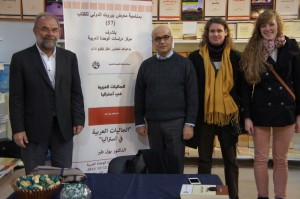 Aitou, Ehden and Hadchit located in the Kadisha Valley in order to prepare field research which will be conducted in the context of the starting DFG-Project „Lebanese Global Village Communities“. Additionally, they visited the coastal cities Byblos, Jounieh and Saida, which rank among the countries attractions for Lebanese families and their migrated relatives, who notably travel back to Lebanon during the Christmas season.
Aitou, Ehden and Hadchit located in the Kadisha Valley in order to prepare field research which will be conducted in the context of the starting DFG-Project „Lebanese Global Village Communities“. Additionally, they visited the coastal cities Byblos, Jounieh and Saida, which rank among the countries attractions for Lebanese families and their migrated relatives, who notably travel back to Lebanon during the Christmas season.
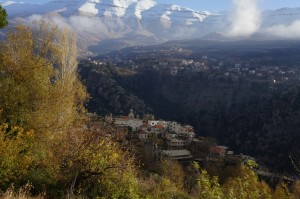 Within several meetings they spoke with Dr. Paul Tabar, associate professor at the Lebanese American University (LAU), about the DFG-project as well as about future cooperation.As part of a master course taught by Professor Dr. Paul Tabar, Dr. Tobias Boos had the opportunity to present the findings of his doctoral thesis and discuss them with students.
Within several meetings they spoke with Dr. Paul Tabar, associate professor at the Lebanese American University (LAU), about the DFG-project as well as about future cooperation.As part of a master course taught by Professor Dr. Paul Tabar, Dr. Tobias Boos had the opportunity to present the findings of his doctoral thesis and discuss them with students.
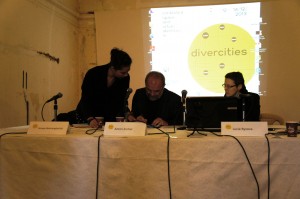 Furthermore the geographers from Mainz participated at the conference „DiverCities“, organized by the Orient-Institut Beirut (OIB) and Goethe-Institut Beirut. The panel „Open Air Spaces of Gathering“ was guided by Prof. Dr. Anton Escher, who presented in his concluding „Wrap Up“ his thoughts on all the previously discussed issues of the conference and further questions to be raised in future research.
Furthermore the geographers from Mainz participated at the conference „DiverCities“, organized by the Orient-Institut Beirut (OIB) and Goethe-Institut Beirut. The panel „Open Air Spaces of Gathering“ was guided by Prof. Dr. Anton Escher, who presented in his concluding „Wrap Up“ his thoughts on all the previously discussed issues of the conference and further questions to be raised in future research.
During his field trip the working group Migration & Diaspora had the opportunity to gain further knowledge concerning the migration movements of Lebanese people, and could also strengthen existing contacts with scholars based in Beirut. Furthermore, they establish numerous new contacts with the staff of the OIB as well as with scholars working in and/or about countries of the Arab world.
Lecture Series - Prof. Dr. Felicitas Hillmann (Freie Universität Berlin): Inwiefern ist Migration eine geographische Antwort auf die Globalisierung?
Department of Geography
Thuesday 04. July 2013, 16:15-18:00pm, Johannes Gutenberg University Mainz, Senatssaal (NatFak)
Lecture Series - Prof. Dr. Christiane Stallaert (Katholieke Universiteit Leuven, Beligien): Subverting Paradigms. Trans-Modern Europe through the Lens of Latin America
Department of Geography
Thuesday 20. June 2013, 16:15-18:00pm, Johannes Gutenberg University Mainz, N6 (NatFak)
Lecture Series - Dr. Malte Steinbrink (Universität Osnabrück): Traveling Slums
Department of Geography
Thuesday 06. June 2013, 16:15-18:00pm, Johannes Gutenberg University Mainz, Senatssaal (NatFak)
Lecture Series - Katharina Abdo (Goethe-Universität Frankfurt): Vom Labor ins Feld. Ökonomische in-vivo-Experimente in Ghana
Department of Geography
Thuesday 02. May 2013, 16:15-18:00pm, Johannes Gutenberg University Mainz, Senatssaal (NatFak)
2012
Project study "Migration and Lebanon“
This year’s project study within the “research-workshop” of the master of arts study in human geography led to Lebanon. Between 27th of July till 7th of August 2012 five students (Carolina Bauer, Malte Böhm, Christina Büns, Judith König and Fabian Weber) went into detail with their own research studies guided by Tobias Boos. The studies focused on the social and economic dynamics of village communities in Wadi Qadisha (Wādῑ Qādῑšā), which are strongly affected by migration movements. Since the end of the 19th century, especially the Christian people from this valley are constantly moving to different countries like Argentina, Australia, Kuwait, Venezuela and the United States. A small number also immigrates to Germany. One group of the young scientists explored the social and economic impacts of cash-return using the village Mazra’at at Tuffah as an example. The other group analyzed the private stories and pictures of families from Ehden and compared them with those of their relatives, who live in Germany and other countries.
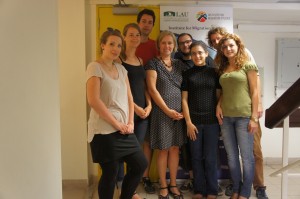 After fieldwork the members of the excursion were able to discuss their experiences with the team of the partner institution “Institute for Migrationstudies” (IMS) in Beirut. Further, it was possible to review current research projects of the IMS-members with the Lebanese colleagues Dr. Jennifer Skulte-Ouaiss, May Habib and Melissa Ajamin.
After fieldwork the members of the excursion were able to discuss their experiences with the team of the partner institution “Institute for Migrationstudies” (IMS) in Beirut. Further, it was possible to review current research projects of the IMS-members with the Lebanese colleagues Dr. Jennifer Skulte-Ouaiss, May Habib and Melissa Ajamin.
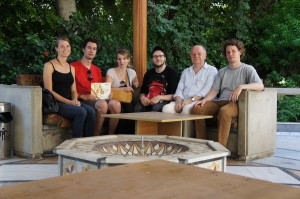 Subsequently the whole group met the acting director of the Orient-Institut Beirut Dr. Thomas Scheffler for an expert talk. Besides the current local politics the actual research projects of the students were topic of the lively debate.
Subsequently the whole group met the acting director of the Orient-Institut Beirut Dr. Thomas Scheffler for an expert talk. Besides the current local politics the actual research projects of the students were topic of the lively debate.
Public lecture of Paul Tabar: Expanding the concept of political remittances: the case of the participation of the Lebano-Australian in 2009 elections
Department of Geography/ZIS
Tuesday 5th June 2012, 6:15-8:00 pm, Johannes Gutenberg University Mainz, Senatssaal (NatFak)
Roundtable of the working group Migration & Diaspora with Lirio Gutiérrez Rivera: Palestinians in Honduras
Department of Geography/ZIS
Wednesday 30th May 2012, 6:15-8:00 pm, Johannes Gutenberg University Mainz, Department of Geography Room 02 235
Roundtable of the working group Migration & Diaspora with Carlos Villela: Diaspora engagement policy in practice: understanding the Mexican Tres Por Uno Program
Department of Geography/ZIS
Wednesday 23rd May 2012, 6:15-8:00 pm, Johannes Gutenberg University Mainz, Department of Geography Room 02 235
Public lecture of Paul Tabar: The benefit of studying diaspora as field: the case of Lebanon
Department of Geography/ZIS
Tuesday 22nd May 2012, 6:15-8:00 pm, Johannes Gutenberg University Mainz, Senatssaal (NatFak)
Public lecture of Koen Leurs: Digital crossroads. A transdisciplinary analysis of Moroccan-Dutch youth’ identifications across digital territories
Department of Geography/ZIS
Monday 14th May 2012, 6:15-8:00 pm, Johannes Gutenberg University Mainz, Senatssaal (NatFak)
Field trip: Arab Diaspora
In the context of the project “Arab Diaspora“ Prof. Escher’s working group “Migration and Diaspora” and students went for an expedition to Lebanon from January 30th to February 6th 2012. The members of the project used this stay abroad to prepare further field studies, which are planned for the coming years. They searched for villages of Wadi Qadisha (Wādῑ Qādῑšā), which are involved in pronounced migration movements and transnational relationships. They also visited important historical places as Beirut, Baalbek (Baʿalbak), Anjar (ʿAnǧar), Byblos respectively Jbeil (Ǧubail) and visited their cooperation partners of the Orient-Institut Beirut. During this field trip the working group attended the Conference „Relationships between Diasporas and their ‚Homelands‘ and their Impact on the State, National Identities and Peace and Conflict“, which was held on campus at the Lebanese American University from 2-4 February 2012.
2011
International Conference: Palestinian, Lebanese and Syrian communities in the world: Theoretical frameworks and empirical Studies
19 - 22 May 2011
Location: Department of Geography, Johannes Gutenberg-Universität, Mainz, Germany
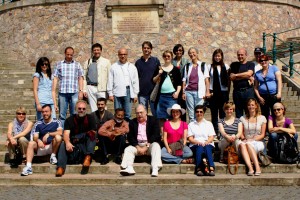
Numerous publications address the Palestinian, Lebanese and Syrian migration flows since 1870 in which numerous groups have settled in various countries around the world. Traditionally this body of work discusses the matter primarily on the basis of migration flows alone. We think, however, that the modern globalized world and the long term social and cultural networks between the diasporic communities challenge this simplistic approach and, therefore, we propose to diversify the focus on three aspects:
- The social dynamics of Arab communities have long since ceased to be determined by migration processes. Instead, a complex interplay of community- and space-building processes is the primary key to unlock these dynamics. Thus the community should be at the centre of further research.
- The increasing significance of diasporic and/or globalised media in capturing the developing character of Arab communities abroad (e.g. cable TV and community based radio stations). As well as Web-based social networks should be considered as a vivid extension of daily life leading to new possibilities of social and cultural organization for communities.
- A transnational perspective considering diasporas in their social field stretched out between their place of residence, the countries of origin and the globally connected communities as the starting point of analysis. But the importance of the nation-state in people’s daily life should be recognised as well.
Organizer: Prof. Dr. Paul Tabar (Institute for Migration Studies, Department of Social Sciences, Lebanese American University, Beirut, Lebanon), Prof. Dr. Anton Escher (Department of Geography, Johannes Gutenberg-Universität, Mainz, Germany) and Tobias Boos (Department of Geography, Johannes Gutenberg-Universität, Mainz, Germany)
